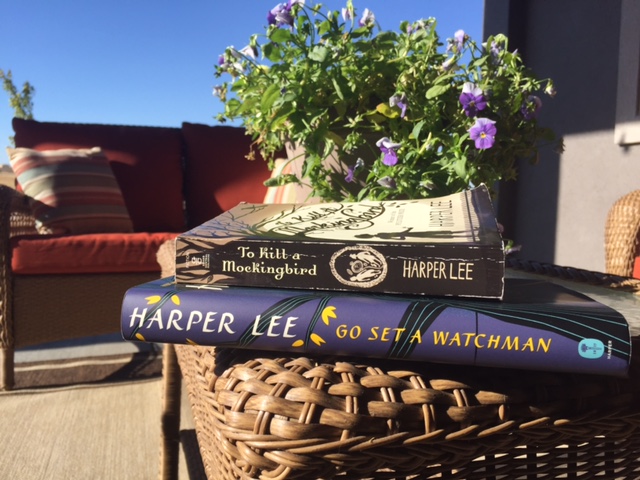"Prejudice, a dirty word, and faith, a clean one, have something in common: they both begin where reason ends."
 Harper Lee's long-awaited sequel to the Pulitzer Prize winner To Kill a Mockingbird once more takes us back to the deeply racially divided South, where our color-blind heroine Scout Finch returns home to Maycomb County to visit her father Atticus in Go Set a Watchman. While discussing the book with a friend on a Labor Day trip to New York, I was reminded that though this is a sequel, it was, in fact, written before Mockingbird. In fact, it’s actually an early version of the novel that was to come To Kill a Mockingbird. I cannot imagine how hard this must be as a writer--to take a character on an emotional roller coaster and then yank them backward into their own childhood. Kudos, Ms. Lee.
Harper Lee's long-awaited sequel to the Pulitzer Prize winner To Kill a Mockingbird once more takes us back to the deeply racially divided South, where our color-blind heroine Scout Finch returns home to Maycomb County to visit her father Atticus in Go Set a Watchman. While discussing the book with a friend on a Labor Day trip to New York, I was reminded that though this is a sequel, it was, in fact, written before Mockingbird. In fact, it’s actually an early version of the novel that was to come To Kill a Mockingbird. I cannot imagine how hard this must be as a writer--to take a character on an emotional roller coaster and then yank them backward into their own childhood. Kudos, Ms. Lee.
Personally, I believe my own second book to be far better than my first attempt. This is how I feel about Harper Lee's work as well. To Kill a Mockingbird infuses the leisurely lifestyle of the southern culture into the novel itself, slowly easing the reader from young Scout's childhood adventures into the story at hand. But beneath her tomboy ways and misadventures with her brother and friends, a tidal wave of change arises in the form of racial inequality. Atticus, Scout's father, is a noble and steadfast rock, guiding Scout and Maycomb with a strong moral compass and nerves of steel. "It's not time to worry yet," he tells his children. The affliction of prejudice unfolds in a relatable and vibrant story.
Go Set a Watchman falls a little short of the pinnacle we see in Mockingbird. The novel starts slowly, introducing us to Scout's love interest and reminding us of how distasteful she finds the expectations put on her as a woman. This isn't surprising, considering we knew her as a tomboy girl, rough around every edge and existing in a largely sexist environment. When something does finally get moving in the plot, chapters filled with page after page of dialogue are difficult to follow. It's hard to understand how someone with such a close relationship with her father wouldn't stop to ask him a question or two before coming unhinged.
The writing isn't completely airtight, or perhaps Scout's personality evolved as she grew older--for some reason our strong, intelligent heroine can't seem to drive well, and never noticed a pregnant woman's belly enough to ask questions about the birds and the bees until in her mid-teens. She is no longer sensible. Instead, she pukes a lot from disgust and stress and refuses to listen to reason, which is one of the lessons imparted by her uncle at the end. There’s also a strange moment where the reader is told that “Atticus could and did prove consent,” with regards to the rape trial, which isn’t true of the first novel.
However, the lessons presented in both books are good ones. Change needs help to walk the miles to the finish line, and that the walk happens one small step at a time. Listening to others, even if you disagree is also important in order to build debate and gain trust. Those upholding the law have a duty to uphold it as written, and not write their own rules without following due process. And a sense of self and who we are, apart from those we admire, is important in guiding our opinions and lives.
We all know racism and discrimination are wrong. But as Hank says, sometimes a mild answer is better than showing his rage. It's difficult, at times, to understand the motivations of the characters in Watchman, but it is similarly difficult in real life. Perhaps that’s how the author meant it.
S. M. Peterson
